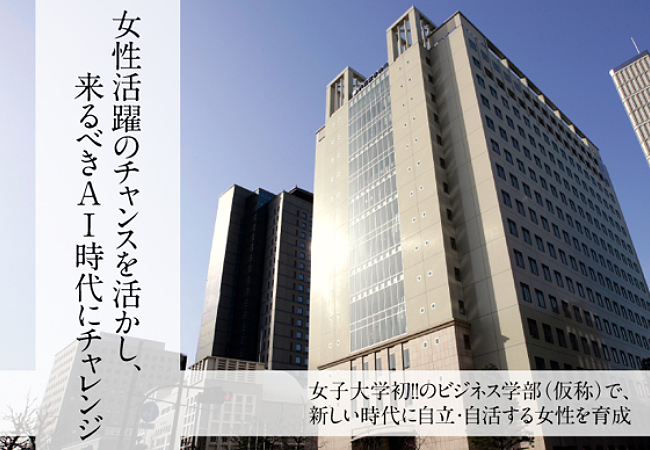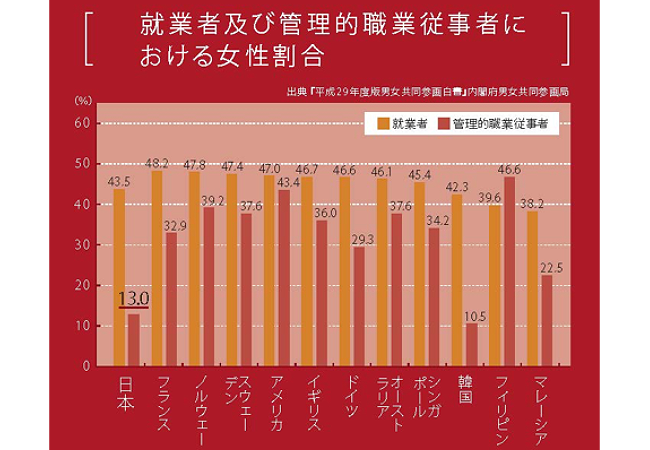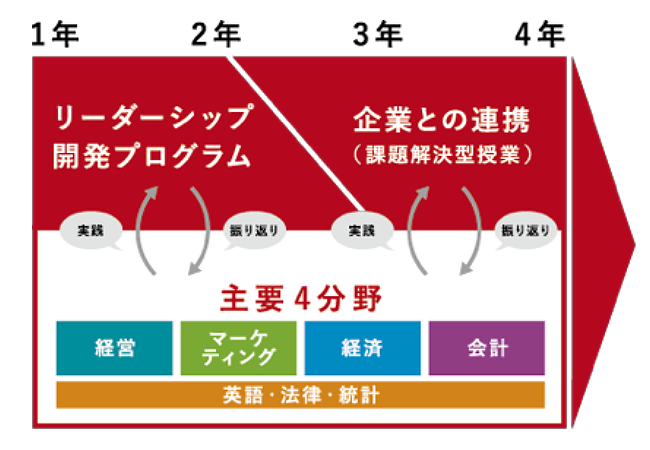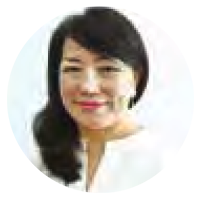First for women's college! !!Fostering women who are independent and self-supporting in a new era at the Faculty of Business (tentative name)

In 2020, with the aim of fostering women who can become independent and self-sustaining in line with the new era, the catchphrase "Business in the middle of Tokyo" was set up, and the first female university's Faculty of Business (tentative name) was established. do.Professor Kazuo Ueda, an economic scholar who is planning to be the dean of the faculty, and Natsu Iwaki, a full-time instructor who specializes in "organization development" and has been involved in human resource development at companies for many years, are the background and aim of opening a new faculty, its uniqueness, We asked about the image of human resources that we would like to develop.
Why is the Faculty of Business (tentative name) at a women's university now?
Ueda: In the business and education world, there is a growing sense of crisis that AI will rob many jobs in the near future.In addition, the IMF has recently issued a shocking report that "Japanese women are most likely to be robbed of their jobs by AI."Of course, it is not necessary to accept it as it is, but I would like the people who will lead the society in the future to acquire the knowledge, skills, and human power that can survive even in the times when it is said that.
On the other hand, in Japan, where the labor shortage is becoming more serious due to the ultra-declining birthrate, it is urgent to secure workers in order to maintain the economic power and people's affluent lives that have been accumulated so far. , The revised Equal Employment Opportunity Law, and many other measures have been launched by the government.
Iwaki: With respect for diversity spreading all over the world, if women advance into society, the values of society as a whole will change significantly.On the business side, it may be easier to generate new ideas and innovations from various perspectives, including women.
Ueda: As expectations for the success of women are rising, there are even greater opportunities for those who want to pursue university in the future.
Big chance, two reasons the numbers show
2: However, compared to developed countries, female managers account for 13.0%, and the percentage of companies represented by females is overwhelmingly low at 7.69%, so there is a lot of room for future growth. (See graph below)

Of course, depending on the work and ability, AI may be replaced, so it is necessary to acquire the knowledge, skills, and human power that are unwavering in such things.
Iwaki: There are many opportunities for women, but it will be a more challenging era.
Specialized knowledge x leadership
Ueda: So what kind of knowledge and skills do you need?There are interesting data and articles that will give you hints on how to think about it.The newspaper at the end of last year said, "Demand for legal personnel is rising."Lawyers are in charge of legal affairs, but their simple tasks are listed as one of the most easily robbed jobs by AI.However, FinTech-related companies, such as companies that automatically create securities reports using AI-based analysis software from deposit account information of small and medium-sized enterprises, have adopted a new business model in terms of legal affairs. Or it is necessary to verify from the aspect of intellectual property, and legal personnel for that purpose are required.Of course, it is not enough to use the conventional standard knowledge.Accounting, etc. 1) Basic knowledge that spans multiple fields is required, 2) Ability to flexibly discover and solve problems in new areas, and 3) People inside or outside the company, or people in different fields. The ability to collaborate and collaborate with each other to achieve the goal is required.
Iwaki: It is exactly the power that society and companies demand, and it is also the three cores of the concept of the new faculty.
4 fields necessary for business, English, law, information / statistics

Ueda: Specifically, first of all, learn about your specialty. In the 1st and 2nd years, students will acquire basic skills in law, information and statistics, and practical English skills in the four fields of economics, management, marketing, and accounting.In addition, through the "Kyoritsu Leadership Program," you will acquire the human power required for business, that is, the power to lead the whole to success while making good use of yourself and others in the team.Then, in the 3rd and 4th years, based on what you learned in the 2st and XNUMXnd years, you will acquire the ability to discover and solve problems that actually occur by yourself through problem-solving learning.Synergistically enhance the knowledge of your area of expertise and the skills you have acquired through your leadership program.
What is the "Kyoritsu Leadership Program"?

Iwaki: 21st century leadership development that is different from the traditional one just to stand on top and lead people.
In the future workplaces and organizations, full-time employees, contract employees, indefinite and fixed-term employees and subordinates will be mixed.Also, the relationship between your boss and your subordinates or juniors will change, such as having to work with subordinates who are older than you or with juniors who are highly specialized.In other words, it is necessary to take actions that can contribute to the whole by demonstrating one's strength in various organizations.This is just leadership and can be acquired through systematic education and training as one of the attitude skills.
Features of the Kyoritsu Leadership Program
Raise skills such as communication skills, problem-solving skills, logical thinking skills, and presentation skills by setting up three behavioral indicators: "goal sharing," "leading example," and "mutual support." Divide into groups of XNUMX or XNUMX people, work under the specific themes and goals presented by the company, and give feedback on what you can and cannot do.Evaluation is based not only on winning a business competition, but also on how much leadership you have learned under various challenges and how much you have actively contributed to the team's achievements.
If you acquire this in the first or second year, you will definitely go to study in the third and fourth years, and to study in groups in seminars and specialized fields.In addition, past experiences, such as club activities in high school, can be reconsidered from a different perspective, and the "experience" can be used not only for business but also for overcoming new challenges.
Ueda: Professor Iwaki has already been working on such a leadership program at Waseda University and Rikkyo University, and since 2017, it has been implemented as a cross-faculty program at our university [lower column].
In 2017, with the theme of how to increase beer consumption by people in Hong Kong and Taiwan, Geely Media & Suntory and Daytona Co., Ltd., which is expanding the select shop "FREAK'S STORE" nationwide in 2018. In collaboration with International, the theme was to quadruple the sales of ladies.
Iwaki: This was my first attempt, but I think that the merit of learning leadership at a women's college is that it is only female students that bring out the diversity of each.The number of students who talk about their strengths with confidence is increasing, and I am very much looking forward to next year and beyond.
Practice in problem-solving lessons and give feedback
Ueda: In the 3rd and XNUMXth years, problem-solving classes, including specialized seminars, will be the main focus.
In the past, the image of a specialized seminar was that the teacher and the student faced each other on a one-to-one basis, but in the Faculty of Business (tentative name), the leadership program was taken over, the students were grouped, and work and discussions were incorporated. I will make it a class.In addition, we will focus on active learning and fieldwork to establish specialized knowledge and further improve communication skills and leadership.We will also actively collaborate with companies and try to choose themes that will be faced in the short or medium to long term after they enter the society.
We are flexible in how to proceed with classes, such as when a company comes to a university or when a company goes from university to a company.One of the highlights is the "Modern Circumstances Series," which takes advantage of its location near Marunouchi and Otemachi, but with nearby publishers, we are planning a program with the theme of "how to increase the sales of manga." increase.
Iwaki: Women have not always been able to exert 100% power in business through various life events.However, the situation has changed drastically, and the stage has been set, with policies to support its success being launched one after another.
Ueda: In the new faculty, I would like to develop the basic ability to work for 40 years in a row while keeping an eye on the progress of AI technology as well as going out to society and working as an immediate force.Please look forward to the first women's college, "Faculty that keeps thinking" after graduation "".
Also pay attention here!
In the entrance examination, a leadership entrance examination (AO entrance examination) and a special commercial qualification entrance examination are also conducted to evaluate the attitude of learning independently and collaborating with various people.As learning support, we will not place specialized subjects in the 5th period, but will set up a "feedback time" that can be used for reviewing classes on a daily basis, and a training camp with teachers about future careers to be held in the summer of the second year. Attention is paid to summer camps and the like.Pre-admission education and post-admission supplementary lessons related to mathematics will also be enhanced.In addition, a career support system is in place, such as regular interviews with all students about learning and careers, with the homeroom teacher playing a central role.

Faculty of Business (tentative name)
Dean (planned)
Kazuo Ueda
Graduated from the Faculty of Science, Massachusetts Institute of Technology, Faculty of Economics, University of Tokyo, Doctor of Economics.He has served as an assistant professor at the University of British Columbia, an assistant professor at Osaka University, and a professor at the University of Tokyo. From 1998 to 2005, he was a policy committee member of the Bank of Japan. Since 2017, he has been the director and professor of the Kyoritsu Women's University New Faculty Establishment Preparation Office.Specializes in macroeconomics and financial theory.His recent book is KADOKAWA, "You can learn financial economics for XNUMX years in college in XNUMX hours."Graduated from Komaba High School attached to Tokyo University of Education.

Faculty of Business (tentative name)
Full-time lecturer (planned)
Dr. Natsu Iwaki
After working in the sales position of a major domestic electrical equipment manufacturer and dispatched to the Japan-US Institute of Management Science (JAIMS), moved to the UK in 1996-2004.University of Wales, Cardiff, UK.Business School, Master of Business Administration (MBA), Doctoral degree credits retreat.Specializes in organizational behavior theory. Involved in the establishment of Qualia Co., Ltd., D & I for 2018 years until March 3.Engaged in organizational development and leadership development as a consultant. He has been in his current position since April 12.

